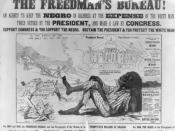Stephanie Eckels
01/21/07
His 72B
Materson
Elisabeth Ritacca
Freedom
In 1866 many newly freed African American women left their masters and traveled a great distance to rebuild their lives in Atlanta. The first stop, for many of the women, was the Freedman's Bureau, a government operated agency that helped former slaves find their families. The question that many people had was why did theses women leave the "comfort" of their master's home. The answer was simple, African American women wanted to protect their dignity, preserve their integrity of their families, and to have fair terms for their labor�. Unfortunately, achieving these goals was not going to be easy. After the civil war, African American women had a hard struggle to be seen as citizens and to gain their rights with Jim Crow becoming increasingly popular in the south. Jim Crow laws were those that many of the southern states created stating "separate but equal" status for African Americans�. One of the biggest obstacles that held African American women back from their rights was the private/public dichotomy model. This model stated that public and private lives were separate and do not involve one another. At the time, the issues that women went through were seen having to deal with only private life, like their family and living conditions. Men were the ones that were responsible for political issues, like voting, which according to the model were considered as the public life. In result, women were hardly ever heard when they spoke about their civil rights. The fight for African American women's rights was the main idea for the book To 'Joy My Freedom by Tera W. Hunter. In the book she wrote about the working class African American women who tried to use their new freedom to gain independence. The...



Nice
This was a nice essay. It flowed well and had a clearly stated thesis. Good work.
0 out of 0 people found this comment useful.